by Rona | Aug 22, 2018 | Announcements, Appearances, KPFA, Radio Shows, Uncategorized
1-800-273-8255 National Suicide Prevention Lifeline. If you or someone you know is considering suicide, call this number. The Lifeline provides 24/7 free and confidential support for people in distress, and resources for you and your loved ones.
My guests, Eli Merritt MD, and Esme Shaller, PhD, joined me to discuss the suffering and anguish that is associated with suicide. We addressed the grief, guilt, and shame people feel when someone they love has killed themselves, and also the pain and hopelessness that a person experiences when they are considering suicide.
Talking about suicide is challenging, but it’s vital that we TALK ABOUT IT.
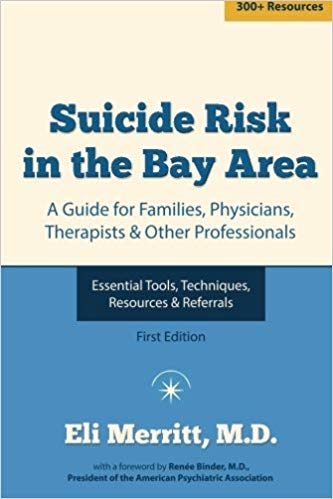 Eli Merritt, M.D., is the founder of Merritt Mental Health, a mental health and addiction care navigation company that connects patients and family members with best-fit, individualized mental health care nationwide. He is the author of Suicide Risk in the Bay Area: A Guide for Families, Physicians, Therapists, and Other Professionals, and is currently a Visiting Scholar at Vanderbilt University where he is investigating a Unified Theory of Depression. Dr Merritt has previously held positions as president of the San Francisco Psychiatric Society and as an Adjunct Clinical Faculty member at Stanford. He completed a B.A. in history at Yale, M.A. in ethics at Yale, medical degree at Case Western Reserve, medical internship at the Lahey Clinic, and residency in psychiatry at Stanford. He has written on diverse topics in medicine, psychiatry, and medical ethics, including diagnosis, insomnia and depression, addiction, suicide prevention, informed consent, and privacy issues in mental illness. He has taught medical students and resident physicians courses on psychiatric interviewing, ethical standards and boundary violations, the placebo effect, hyperthyroidism, and medical decision-making, among other subjects.
Eli Merritt, M.D., is the founder of Merritt Mental Health, a mental health and addiction care navigation company that connects patients and family members with best-fit, individualized mental health care nationwide. He is the author of Suicide Risk in the Bay Area: A Guide for Families, Physicians, Therapists, and Other Professionals, and is currently a Visiting Scholar at Vanderbilt University where he is investigating a Unified Theory of Depression. Dr Merritt has previously held positions as president of the San Francisco Psychiatric Society and as an Adjunct Clinical Faculty member at Stanford. He completed a B.A. in history at Yale, M.A. in ethics at Yale, medical degree at Case Western Reserve, medical internship at the Lahey Clinic, and residency in psychiatry at Stanford. He has written on diverse topics in medicine, psychiatry, and medical ethics, including diagnosis, insomnia and depression, addiction, suicide prevention, informed consent, and privacy issues in mental illness. He has taught medical students and resident physicians courses on psychiatric interviewing, ethical standards and boundary violations, the placebo effect, hyperthyroidism, and medical decision-making, among other subjects.
Esme Shaller, Ph.D., is an Associate Clinical Professor in the Department of Child Psychiatry at UC San Francisco and in the Department of Psychology at UC Berkeley. She is the director of the Dialectical Behavior Therapy Program at UCSF and the Clinical Director of Outpatient Services for Child Psychiatry. Dr. Shaller’s passion lies in the teaching and dissemination of empirically supported treatments for complex psychological problems, particularly in adolescence. As such, she devotes a large percentage of her time to teaching and training, both within UCSF’s residency and fellowship programs and in the larger Bay Area community. She has worked with other members of her team to implement comprehensive DBT for low income teens in three California Counties. Dr. Shaller received her B.A. in psychology with highest honors from UC Berkeley and her Ph.D. in clinical psychology from the State University of New York, Stony Brook. Subsequently, she completed her psychology internship at the Zucker Hillside Hospital at Long Island Jewish Medical Center in Queens (where she fell in love with DBT!), followed by a postdoctoral fellowship at Kaiser Permanente in South San Francisco. She has been at UCSF since 2007.
by Rona | Aug 15, 2018 | Announcements, KPFA, Podcasts, Radio Shows
Listen now to today’s show (8/20/18) on “About Health” KPFA 94.1FM
 The ACE’s study is one of the largest investigations conducted to assess associations between childhood maltreatment and later-life health and well-being. The study is a collaboration between the Centers For Disease Control (CDC) and Kaiser Permanente’s Health Appraisal Clinic in San Diego.
The ACE’s study is one of the largest investigations conducted to assess associations between childhood maltreatment and later-life health and well-being. The study is a collaboration between the Centers For Disease Control (CDC) and Kaiser Permanente’s Health Appraisal Clinic in San Diego.
How have the adverse experiences of your childhood impacted your physical and emotional health as an adult? Some steps in healing is understanding and untangling what happened, talking about the trauma, and learning resiliency skills. When a child is acting out in school, or an adult is abusing drugs or alcohol we can ask, “What happened to her, instead of what’s wrong with her.”
Guests:
Lisa Frederiksen is the author of hundreds of articles and 11 books, including “If You Loved Me, You’d Stop!,” “Addiction Recovery: What Helps, What Doesn’t,” and “Secondhand Drinking: the Phenomenon That Affects Millions.” She is a national keynote speaker with over 30 years speaking experience, consultant, and founder of BreakingTheCycles.com. She has spent more than 15 years studying 21st century brain research in order to write, speak, and consult on a range of brain-related topics, including: ACEs, toxic stress, trauma, substance use disorders, secondhand drinking, mental illness, brain development, and addiction treatment and recovery. Some of her consulting has been overseas in countries such as Kenya, Slovenia, and Mexico. Lisa is an active member of the ACEs Connection~Resilient Sac Community.
Wendie Skala, BSN, MS. When she first became a nurse she specialized in intensive care and emergency nursing. Wendie flew for Stanford Life Flight for 10 years and honed her skills in prehospital transport of critically injured patients. She joined the Air Force Reserve in 1999 and achieved the rank of Lt. Col. while serving 7 deployments overseas in support of OPERATION IRAQI AND ENDURING FREEDOM. Along with transporting wounded warriors, she assumed command and control roles and functioned as the Chief Nurse for air operations in Afghanistan, and she earned her Masters’ Degree in Military Science. In 2009, she took on the role as the Injury Prevention Coordinator for Kaiser Permanente’s first trauma center in South Sacramento. There she implemented the Sacramento Violence Intervention Program that provided services for shot, stabbed, and almost assaulted to death victims of violence along with her other work preventing motor vehicle crashes and older adult falls. Some of the programs she championed in the community included the Alternatives to Violence Program and Standing Up Resilient Sac, an ACEs Connection Collaborative. In her role at Kaiser Permanente, Wendie worked with law enforcement, schools, non-profits, and government agencies to educate about ACEs and Trauma Informed Care. She has presented nationally on the subject and is a contributing author and educator of the American Trauma Society’s Injury Prevention Course. Currently, Wendie is Adjunct Faculty at Samuel Merritt’s School of Nursing in Sacramento and continues to work with ACEs Connection and Resilient Sac.
Resources:
Nadine Burke Harris, MD is the author of the book “the deepest well, Healing the Long-Term Effects of Childhood Adversity.
by Rona | Jul 20, 2018 | Announcements, Appearances, KPFA, Podcasts, Radio Shows
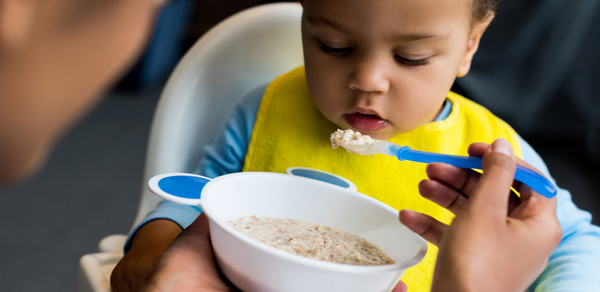
Listen to todays show I hosted on KPFA, 94.1FM, “About Health” 7/23/18
“Today, pesticide use is at an all-time high and these agrochemicals are finding their way into our livestock, agricultural industries, and ultimately, onto our plates.” —What’s Making Our Children Sick?
Did you know that Glyphosate herbicide has been found in popular cereals?
The Center for Environmental Health’s (CEH) independent testing of a variety of American cereals found many common brands of conventional products contained residue levels of the weed killer glyphosate. This toxic chemical has been shown to cause birth defects in laboratory animals and disrupt hormone function. Recently, the World Health Organization classified glyphosate as a “probable human carcinogen.”
Joining us for this important conversation is Carolyn Cox. Caroline leads The Center for Environmental Health‘s (CEH) research on toxic exposures, identifying, analyzing, and substantiating the scientific bases to eliminate threats to children and others exposed to dangerous chemicals in consumer products. She joined CEH after working on pesticide toxicity and alternatives to their use for over 15 years, and serves on the Board of Directors of Beyond Pesticides. She is passionate about protecting our world from toxic chemicals. Caroline has a master’s degree in entomology from Oregon State University
Also joining us is Michelle Perro, MD, a veteran pediatrician with over thirty-five years of experience in acute and integrative medicine. More than ten years ago, Dr. Perro transformed her clinical practice to include pesticide and health advocacy. She has both directed and worked as attending physician from New York’s Metropolitan Hospital to UCSF Benioff Children’s Hospital Oakland. Dr. Perro has managed her own business, Down to Earth Pediatrics. She is currently lecturing and consulting as well as working with Gordon Medical Associates, an integrative health center in Northern California. She is the co-author of “What’s Making our Children Sick?”
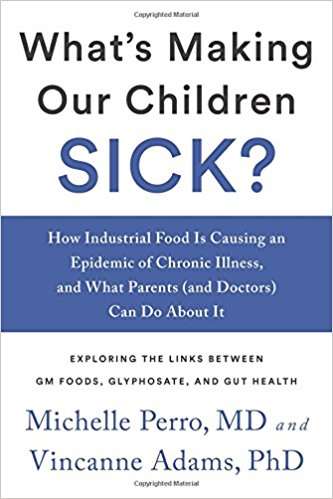
by Rona | May 24, 2018 | Announcements, Appearances, KPFA, Podcasts, Radio Shows
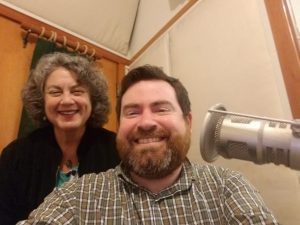 David B. Feldman joined me on “About Health” on KPFA.org for a discussion about people who experience physical trauma and the aftermath of their experience. Why do some people recover faster? And how can a person’s attitude, outlook, and social support, make a difference?
David B. Feldman joined me on “About Health” on KPFA.org for a discussion about people who experience physical trauma and the aftermath of their experience. Why do some people recover faster? And how can a person’s attitude, outlook, and social support, make a difference?
David B. Feldman, PhD, is considered to be among the top experts on hope in the field of psychology. Professor and Chair of the Department of Counseling Psychology at Santa Clara University, his research and writings have addressed such topics as hope, meaning, and growth in the face of serious medical illness, trauma, and other highly stressful circumstances. He is the co-author of three books, including The End-of-Life Handbook: A Compassionate Guide to Connecting with and Caring for a Dying Loved One, and Supersurvivors: The Surprising Link Between Suffering & Success. His research has been published in numerous scientific journals as well as in popular publications. He has appeared in such magazines as SELF, People, ‘O’: The Oprah Magazine, U.S. News & World Report, and Harvard Business Review, has been interviewed for national television and radio, and writes regularly for Psychology Today. In addition, he is the host of the podcast “Psychology in 10 Minutes,” which can be found at www.psychologyin10minutes.com or on any podcast app. More information about Dr. Feldman can be found at www.davidfeldmanphd.com.
by Rona | May 18, 2018 | Announcements, Appearances, KPFA, Podcasts, Radio Shows
Learn about Brain-Changing Practices for Release from Fear, Panic, and Worry
“About Health” on 94.1FM KPFA.org
Listen here: https://kpfa.org/player/?audio=285641
This was a fund raising show that aired on May 21, 2018
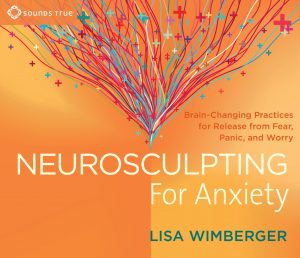
by Rona | Apr 26, 2018 | Announcements, Appearances, KPFA, Podcasts, Radio Shows
Listen to todays show on 94.1FM, KPFA.org (4/30/18) “About Health”
I was joined by David B. Feldman, PhD
What happens when someone you care about is diagnosed with a serious illness? Do you know how to get the care needed, and how to have the difficult conversations about prognosis? There are many decisions to make, and medical professionals are often not trained to give the support that is needed.
Palliative care is whole-person care that relieves symptoms of a disease or disorder, whether or not it can be cured.
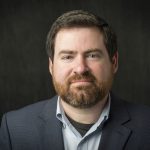 David B. Feldman, PhD, is considered to be among the top experts on hope in the field of psychology. Professor and Chair of the Department of Counseling Psychology at Santa Clara University, his research and writings have addressed such topics as hope, meaning, and growth in the face of serious medical illness, trauma, and other highly stressful circumstances. He is the co-author of three books, including The End-of-Life Handbook: A Compassionate Guide to Connecting with and Caring for a Dying Loved One, and Supersurvivors: The Surprising Link Between Suffering & Success. His research has been published in numerous scientific journals as well as in popular publications. He has appeared in such magazines as SELF, People, ‘O’: The Oprah Magazine, U.S. News & World Report, and Harvard Business Review, has been interviewed for national television and radio, and writes regularly for Psychology Today. In addition, he is the host of the podcast “Psychology in 10 Minutes,” which can be found at www.psychologyin10minutes.com or on any podcast app. More information about Dr. Feldman can be found at www.davidfeldmanphd.com.
David B. Feldman, PhD, is considered to be among the top experts on hope in the field of psychology. Professor and Chair of the Department of Counseling Psychology at Santa Clara University, his research and writings have addressed such topics as hope, meaning, and growth in the face of serious medical illness, trauma, and other highly stressful circumstances. He is the co-author of three books, including The End-of-Life Handbook: A Compassionate Guide to Connecting with and Caring for a Dying Loved One, and Supersurvivors: The Surprising Link Between Suffering & Success. His research has been published in numerous scientific journals as well as in popular publications. He has appeared in such magazines as SELF, People, ‘O’: The Oprah Magazine, U.S. News & World Report, and Harvard Business Review, has been interviewed for national television and radio, and writes regularly for Psychology Today. In addition, he is the host of the podcast “Psychology in 10 Minutes,” which can be found at www.psychologyin10minutes.com or on any podcast app. More information about Dr. Feldman can be found at www.davidfeldmanphd.com.
 The ACE’s study is one of the largest investigations conducted to assess associations between childhood maltreatment and later-life health and well-being. The study is a collaboration between the Centers For Disease Control (CDC) and Kaiser Permanente’s Health Appraisal Clinic in San Diego.
The ACE’s study is one of the largest investigations conducted to assess associations between childhood maltreatment and later-life health and well-being. The study is a collaboration between the Centers For Disease Control (CDC) and Kaiser Permanente’s Health Appraisal Clinic in San Diego. David B. Feldman joined me on “About Health” on KPFA.org for a discussion about people who experience physical trauma and the aftermath of their experience. Why do some people recover faster? And how can a person’s attitude, outlook, and social support, make a difference?
David B. Feldman joined me on “About Health” on KPFA.org for a discussion about people who experience physical trauma and the aftermath of their experience. Why do some people recover faster? And how can a person’s attitude, outlook, and social support, make a difference?




 David B. Feldman, PhD, is considered to be among the top experts on hope in the field of psychology. Professor and Chair of the Department of Counseling Psychology at Santa Clara University, his research and writings have addressed such topics as hope, meaning, and growth in the face of serious medical illness, trauma, and other highly stressful circumstances. He is the co-author of three books, including The End-of-Life Handbook: A Compassionate Guide to Connecting with and Caring for a Dying Loved One, and Supersurvivors: The Surprising Link Between Suffering & Success. His research has been published in numerous scientific journals as well as in popular publications. He has appeared in such magazines as SELF, People, ‘O’: The Oprah Magazine, U.S. News & World Report, and Harvard Business Review, has been interviewed for national television and radio, and writes regularly for Psychology Today. In addition, he is the host of the podcast “Psychology
David B. Feldman, PhD, is considered to be among the top experts on hope in the field of psychology. Professor and Chair of the Department of Counseling Psychology at Santa Clara University, his research and writings have addressed such topics as hope, meaning, and growth in the face of serious medical illness, trauma, and other highly stressful circumstances. He is the co-author of three books, including The End-of-Life Handbook: A Compassionate Guide to Connecting with and Caring for a Dying Loved One, and Supersurvivors: The Surprising Link Between Suffering & Success. His research has been published in numerous scientific journals as well as in popular publications. He has appeared in such magazines as SELF, People, ‘O’: The Oprah Magazine, U.S. News & World Report, and Harvard Business Review, has been interviewed for national television and radio, and writes regularly for Psychology Today. In addition, he is the host of the podcast “Psychology